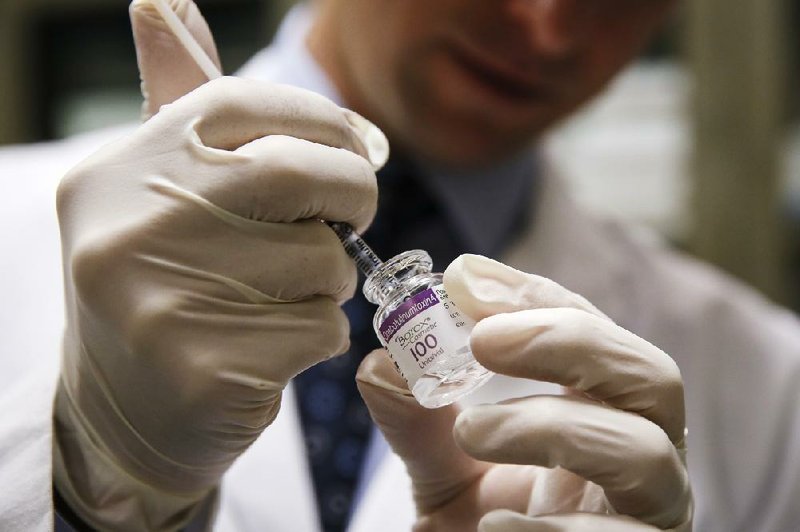Valeant Pharmaceuticals has pumped more cash into its bid for Botox-maker Allergan, and it also defended its business model on Wednesday, a day after its reluctant acquisition target aired more concerns about a deal.
The Canadian drugmaker said it will now offer $58.30 and a part of its stock for each Allergan share. The revised bid could be worth more than $50 billion, on the basis of Tuesday's closing price for U.S.-traded shares of Valeant. But it still may not be enough to get Allergan to the negotiating table, analysts say.
Valeant Pharmaceuticals International Inc. also threw in a contingent value right worth up to $25 per share and based on future sales of a potential eye treatment.
Valeant raised the cash part of its offer by $10 a share from a previous bid of $48.30. That was part of an unsolicited offer rejected by Allergan that was worth nearly $46 billion when Valeant announced it last month.
Allergan Inc. said in a brief statement Wednesday that it would carefully review the new proposal.
Valeant Chairman and Chief Executive Officer J. Michael Pearson told investors in a Wednesday-morning webcast that he had talked to many Allergan stock owners "and the real message we continually got back is Allergan shareholders want this deal to occur, but they wanted a higher price."
That price still may not be high enough for investors. Shares of both companies fell Wednesday while broader trading indexes were largely flat.
The latest bid totals about $166 in cash and stock for each Allergan share, and shareholders may be looking for something in the $180 range, Credit Suisse analyst Dr. Vamil Divan said in a research note.
Allergan, which also makes the dry-eye treatment Restasis, has said repeatedly that it opposes a deal with Valeant. Shortly after Valeant made its offer public, Allergan announced a so-called poison-pill plan, a defensive tactic that makes a buyout prohibitively expensive. Earlier this month, Allergan said that Valeant's uncertain prospects for long-term growth and its business model create a risk for Allergan shareholders given the stock component of the offer.
On Tuesday, Allergan questioned Valeant's ability to deliver organic growth, which doesn't count gains through acquisition. It also said in a statement that the Canadian company has limited experience with "large, global scale products" and would cut research and development costs too much.
Citigroup Inc. analyst Liav Abraham said in a research note that said she doesn't expect the latest Valeant offer to bring Allergan to the negotiating table for a friendly transaction. She has low expectations for the eye treatment involved in the contingent value right, and she predicts that Valeant will take its bid hostile and go directly to Allergan shareholders after the company rejects the latest overture.
Valeant made its initial bid along with activist investor Bill Ackman. The investor's Pershing Square Capital Management LP holds a 9.7 percent stake in Allergan. Pershing had agreed to take only stock if the deal went through and would remain as a long-term shareholder of the combined company.
Pearson, the Valeant CEO, said Wednesday in a letter to his Allergan counterpart, David Pyott, that the two sides should meet.
"It appears based on Allergan's recent public statements that you have a fundamental misunderstanding of our business model and its performance," Pearson wrote.
Valeant also said that Allergan's analysis of Valeant's business "was full of errors" and its operating model would speed up growth for Allergan products, especially in developing markets.
Pearson also touted the performance of several Valeant executives during his presentation to investors although he acknowledged he couldn't pronounce some of their last names.
Separately, Nestle said Wednesday that it will pay $1.4 billion in cash to Valeant for the rights to sell lip and wrinkle treatment Restylane and other skin products in the U.S. and Canada.
Valeant completed an $8.7 billion acquisition of contact lens-maker Bausch + Lomb last year. Its latest deal comes amid a surge of pharmaceutical bids as drugmakers seek to grow or ditch assets that aren't central to their business.
The Valeant-Allergan saga is one of several multibillion-dollar acquisition stories the drug industry has seen so far this year.
British drugmaker AstraZeneca rejected several takeover offers from U.S. counterpart Pfizer, the latest being a nearly $119 billion deal that would have amounted to the richest acquisition ever among drugmakers. Switzerland's Novartis AG has agreed to buy GlaxoSmithKline's cancer-drug business for up to $16 billion while selling most of its vaccine business to GSK for $7.1 billion, plus royalties.
Shares of Irvine, Calif.-based Allergan Inc. fell 5.4 percent, or $8.90, to close Wednesday at $156.12, and U.S.-traded shares of Valeant dropped $3 to $126.95.
Business on 05/29/2014
